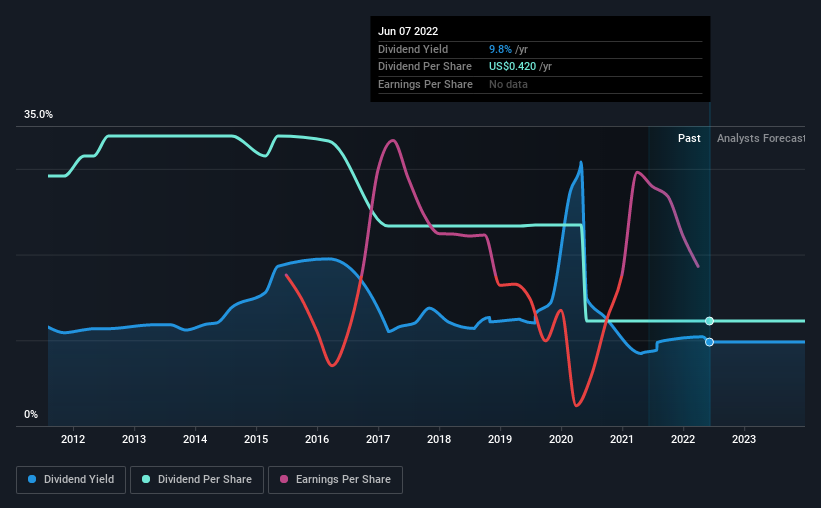Oxford Square Capital (NASDAQ:OXSQ) Has Re-Affirmed Its Dividend Of US$0.035
The board of Oxford Square Capital Corp. (NASDAQ:OXSQ) has announced that it will pay a dividend on the 30th of June, with investors receiving US$0.035 per share. The dividend yield will be 9.8% based on this payment which is still above the industry average.
Check out our latest analysis for Oxford Square Capital
Oxford Square Capital Doesn't Earn Enough To Cover Its Payments
A big dividend yield for a few years doesn't mean much if it can't be sustained. Before this announcement, Oxford Square Capital was paying out 217% of what it was earning, and not generating any free cash flows either. Paying out such a large dividend compared to earnings while also not generating free cash flows is a major warning sign for the sustainability of the dividend as these levels are certainly a bit high.
The next 12 months is set to see EPS grow by 58.9%. However, if the dividend continues growing along recent trends, it could start putting pressure on the balance sheet with the payout ratio reaching 118% over the next year.
Dividend Volatility
The company's dividend history has been marked by instability, with at least 1 cut in the last 10 years. The dividend has gone from US$1.00 in 2012 to the most recent annual payment of US$0.42. This works out to be a decline of approximately 8.3% per year over that time. A company that decreases its dividend over time generally isn't what we are looking for.
The Dividend Has Limited Growth Potential
Given that the track record hasn't been stellar, we really want to see earnings per share growing over time. Oxford Square Capital's earnings per share has shrunk at 41% a year over the past five years. This steep decline can indicate that the business is going through a tough time, which could constrain its ability to pay a larger dividend each year in the future. Over the next year, however, earnings are actually predicted to rise, but we would still be cautious until a track record of earnings growth can be built.
We're Not Big Fans Of Oxford Square Capital's Dividend
In summary, while it is good to see that the dividend hasn't been cut, we think that at current levels the payment isn't particularly sustainable. The company's earnings aren't high enough to be making such big distributions, and it isn't backed up by strong growth or consistency either. Overall, the dividend is not reliable enough to make this a good income stock.
Companies possessing a stable dividend policy will likely enjoy greater investor interest than those suffering from a more inconsistent approach. Still, investors need to consider a host of other factors, apart from dividend payments, when analysing a company. Just as an example, we've come across 4 warning signs for Oxford Square Capital you should be aware of, and 3 of them are a bit unpleasant. If you are a dividend investor, you might also want to look at our curated list of high yield dividend stocks.
Have feedback on this article? Concerned about the content? Get in touch with us directly. Alternatively, email editorial-team (at) simplywallst.com.
This article by Simply Wall St is general in nature. We provide commentary based on historical data and analyst forecasts only using an unbiased methodology and our articles are not intended to be financial advice. It does not constitute a recommendation to buy or sell any stock, and does not take account of your objectives, or your financial situation. We aim to bring you long-term focused analysis driven by fundamental data. Note that our analysis may not factor in the latest price-sensitive company announcements or qualitative material. Simply Wall St has no position in any stocks mentioned.

 Yahoo Finance
Yahoo Finance 
